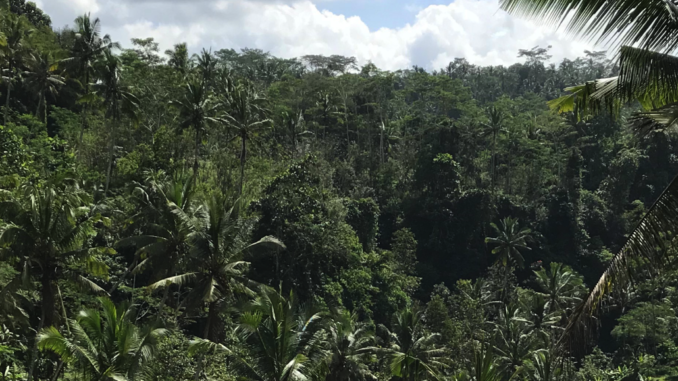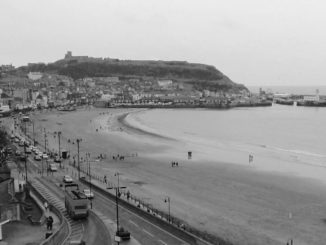
Jungle and rise fields, Bali, Indonesia, Dudva – Licence CC BY-SA 4.0
I’m sitting at the edge of a thinning of the rainforest. My two tail-end Charlies are squatted beside me having just returned from an evening recce. Our other companions are making camp for the night, collecting kindling, starting a fire. We are being followed. There are at least half a dozen of them, armed, big ‘Manila types’, professionals. Hammock tents have been strung between trees, their party must include a VIP or two. Lucky them, we spend the night on the forest floor, being eaten alive by insects, in between nervous watches.
* * *
Next day we had a different formation, one of my tail-end Charlies became a scout, running ahead of farmer John and old farmer Lupe, who, with their machetes, cleared a way for the pack bearers. Myself, Miss Cortez and the Girl Twin were those packs bearers and one tail-end Charlie, now armed with my gun, was at the rear, aware that the following party would have their own forward scout.
After two hours of slow but constant progress, we bunched together for a breather. Scout had nothing to report except more jungle. There were no signs of life, no sign of a proper path, no smell of smoke, no settlement noises. There was nothing to suggest that we were close to Utopia. Charlie had seen our pursuer’s scout.
‘They make good progress but I don’t think they catching us up, mister. They are good but not countrymen. They have trained for this place but not lived in it,’ he concluded.
I suggested an ambush or a sabotage of the trail behind us. None of the others were keen. We might lose a firefight. Charlie was sure that their scout was carrying an automatic weapon and was wearing big boots as if a soldier or mercenary. We might all lose each other if dispersed into the thick undergrowth either side of the track, necessary for an ambush. As for sabotaging the route, preparing traps and pits would slow us down too.
‘The best plan is to make haste to Utopia,’ I decided, stating the obvious, ‘There’s weight of numbers there. One big, cohesive group, comfortable with the terrain. There are no personal weapons at Utopia, for the harmonious living together, but plenty of machetes and hunting rifles. We’ll get up there, fan the Utopians out through the jungle and intercept the mercenaries or whoever they are. They won’t want to take us all on.’
‘We might even convert them to peace, harmony and communal living,’ Miss Cortez ventured. They all laughed, I joined in.
We strung out again, that nimble unarmed Scout ahead, machetes and packs next, then Charlie. On we plodded. I must say, the jungle is a God dammed awful place. A native’s graveyard as well as a white man’s. That’s why they want to burn it down and cover it in concrete. Good luck to them, the sooner the better
As per the previous day, I was very tempted to doubt John’s route making. How the hell did he do it without a compass or map? We couldn’t even see the sky, let alone the sun, but he was confident in his machete swings and his path did look reassuringly straight. Minutes seemed like hours. Sweat and heat, endless plod, oft interrupted by my myself having to pause. After a short while and a touch of water to the lips, I was ready for the off again but the stops were becoming too frequent and I was slowing everyone down.
A message from Scout passed down the line to John, then to Miss Cortez and via her to me (yes, I was lagging behind the girls). There was something ahead, more than a clearing, the start of cultivation. You might think that this was undiluted good news to be celebrated but I was just puzzled. I thought out loud, wondering to the darkness and the tree trunks, ‘Noises? Smells? Chatter? Their pickets? Singing in the fields? Mellowing carabao?’
With no competition from a city’s sounds and fumes, we should have been aware of Utopia from a distance, as a mariner approaching the littorals can smell land and taste freshwater. We ignored any deadline for rests and snacks and pushed on, making one last, big effort. Sure enough, close to nightfall, the jungle cleared. Chopped trees were piled up. The canopy above thinned enough to allow a privileged sight of sky and the first three stars of sunset. I thought about beds and huts, concrete and generators, maybe a shower, roast pig even.
John and of the others were well ahead of me. By the time I reached them, they were at the edge of a decent-sized, cleared acreage. It couldn’t be nature or the lie of the land, it had to be our Utopia. Charlie had caught me up. I chatted to him as we walked the last dozen yards to where John and Lupe stood resting on their machetes. Miss Cortez and the Girl Twin were beside them, sat on their packs. Charlie gave me a situation report. The other party hadn’t caught us up by very much at all.
‘Their front scout has turned back, as though they will make camp for the night further down the trail and will do the last part of the journey at first light.’
I took the last few steps forward, thanked John for guiding us and apologized to him for doubting his direction. He held out a tired palm, offering a handshake topped by a weak smile. Besides ourselves, there was little to see, apart from an absence of foliage. There was no sign of habitation. It was Utopia, it couldn’t be anywhere else, what was left of it.
All the huts had gone. There was no sign of the corrugated sheets that had been so laboriously carried along the trail. Some badly laid concrete sets remained. A fair area had been farmed, some already reclaimed by weeds and small bushes. Everything else had gone. What hadn’t been stolen had been burned. There was black ash amongst the soil and a stink of rotting flesh.
Scout found a body, ‘Want to see it?’, he asked.
‘Later.’
I imagined a sea of bone and maggots. It was my fault. I’d dig a grave later, somehow. I assumed it would be my agent, fatally tasked to discourage any slacking amongst the Utopians. The sun sank. We improvised a fire and set watches. It was unlikely that the other party would set off before sunrise but you never know. Our luck seemed to be out. With the settlement abandoned we’d also have to assume the native tribe, the T’boli, might be nearby.
I’ll be honest with you dear reader, during my watch, on the edge of the clearing, being eaten alive by creepy crawlies, I wept. Not for myself, but for Miss Cortez and the others, innocents in this. It hadn’t been their idea. They were here for the money and then, not from greed, but because they really needed it. Some anguish having poured from me, my mood improved and improved more when Miss Cortez crouched down beside me, arriving early for the change of lookouts. She cradled Lupe’s farm gun.
‘Did you know about this?’ I asked her.
‘I had heard rumours.’
‘You could have told me.’
‘But you are always right mister, you were so certain of the success of this place.’
She repeated my great project’s hubristic epitaph, ‘You are always right, mister.’
She changed the subject.
‘About that rich foreigner,’ she queried.
There was a box in a draw in the Anglo Philippine office in Davao City. I would give her keys to the premises. They were in my pack. She could manage the shop while I was away, possibly permanently if I ended up in a shallow grave, at the other side of Utopia, next to my agent. She could take her pick of the bachelors from the ‘Introductions’ box. Unconcerned by my demise, she wondered of the eligibility of the gentleman involved.
‘Better than the last lot,’ I assured her, unconvincingly.
‘I’ve vetted these ones,’ I fibbed.
If you’ve ever wondered what chaps in uniform mutter to each other while saluting at the change of the guard, now you know.
* * *
Next morning, just before light, we fanned out, concealed, awaiting our pursuers. We had nowhere to run. Befitting of a jungle, it was survival of the fittest, or craftiest if we might have a chance to parley. At an impromptu al fresco strategy meeting, we had agreed on sounds and hand signals. Running around the clearing shouting, ‘White flag! White flag!’ wasn’t one of them but that’s what happened and that’s what drew me out of my hiding place.
‘White flag coming up the trail, mister,’ gasped Charlie and Scout.
Parley it was going to be. I sent the pair of them back into the undergrowth to hide. I stood alone on the edge of the deserted settlement. Sure enough, there was movement beyond. A goon in a dark uniform held a white handkerchief above his head. His automatic weapon appeared to be slung across his back. I made sure that he saw me hold my gun to the sky then tuck it into my belt. I put my hands on my hips. He stopped. I folded my arms across my chest, like a cross governess. Reassured by my hands being further away from my gun, he took a few more steps forward. We stared at each other, fifteen yards apart. Behind him, his companions began to spill out of the jungle.
I wondered who, of all toes I’d trodden on, should have sent a hunting party. Politicians, prisoners, police? Parents of missing girls, thwarted terrorists, jealous husbands? Nope, I couldn’t think of any jealous husbands. You may recall Gisele’s fertile time disaster date was Bibi, not me. Although that was my fault too, but was it worth killing for? Stranger things have happened. I was making the mistake of assuming that the brain, rather than the gonads, does the deciding. The RAND organization, do they kill people who keep the wrong books instead of shredding them? Surely not, but they would know how to find the guilty chap, do the killing and then blame it on Colombian separatists – no matter what part of the world it happened in. Jealous husband update; would a Saudi prince go to all this trouble to wipe out the only other man in the world who’d (accidentally) seen his pretty wife’s secret? You know, he might just.
This was beginning to feel like less of a ‘parley’ and more of a pause required to set up a firing squad. Mayor Duterte’s goons, General President Ramos’s goons, Senator Webb’s goons? In the cold light of realising there’d been plenty of heavy hints, none of which I’d taken any notice of, this was not so much a firing squad, more of a firing army. A previous life passed before me; being rude to the French, the entire population of Hong Kong stinking of fish, those awfully tricky chaps at collapsing BCCI. Bin Laden’s cash and carry, did I not buy enough bullet holed Afghan endangered species pelts?
Eyeball to eyeball with the reaper, there appeared to be an awful lot of reasons for him to take me. Standing there, that very minute, I felt that I’d made such a mess of my life that I was tempted to shoot myself. I settled upon the Anglo Philippine Enterprise and Friendships Company’s introduction of Filipino ladies to American gentlemen. Who would be the more murderously disappointed and better armed? The forty-year-old woman (with five children) from a tin shack expecting a billionaire, or the bankrupt Kentucky chicken farmer expecting to marry a teenaged film star for forty dollars?
My pursuers were all now in clear sight. They consisted of the best and most expensive local guide, six heavily armed bodyguards and a maid holding a parasol above a VIP. The VIP was female. The two ladies approached me. I was about to be put out of my misery.
Asked to compare her to a film star, I must say a young Nicole Kidman. She was thin but nicely figured, tall for a woman, only two inches shy of myself. Her hair, a few shades from ginger, genuine titian. Tucked into a floppy bush hat, strands hung about the back and sides of a pretty head but were cleared away from her face. A face of delicate features, palest white, no need for makeup. Her thin lips were dark pink rather than red. If English, she would have been ‘porcelain’, but being colonial she was just ‘whitest’. So much so, that her bodyguards had nicknamed her ‘whiter than paper’.
As well as a thin layer of sunblock, she wore a white shirt and tan shorts. Given the terrain, her bare legs showed surprisingly few bites and scratches. Beneath the shirt, she had a birthmark on the lower right-hand side of her neck and her shoulders were heavily freckled by hours of childhood play on a deserted beach, far better than Bondai.Her voice, a whisper, belonged to an antipodean. It was not of a valley girl, but of a ten-pound pom’s large family made good. How did I know all of this at one glance?
After mud, prefabs, killer spiders, flood and drought, she’d been finished at an English girl’s boarding school. With iron-framed beds and a fifty-girl dorm to add to that list, maybe the jungle was a nice little improvement? Her school had been a stone’s throw away from an austere catholic boy’s from which, on dance nights and socials, she had mixed with all kinds of older nefarious types.
How do I know all of this in one glance? It’s a bit obvious, isn’t it? Couples have a way of finding each other and continuing to bump into each other until they take the hint and tie the knot. If the trade winds of derring-do subsequently separate them, an oft un-gentle tide will wash them to the same shore, re-united. It was my wife.
‘So, this must be your Utopia,’ she pondered as she glanced around the destruction, ‘a place of peace, cooperation, harmony and loving coming together between different peoples,’ she was quoting from one of my promotions, remembered from the back of a Computer Club flier.
‘Nice and peaceful after they’ve all slaughtered each other,’ she observed.
‘And what part of your Utopia was this very spot?’ she asked.
I had a good look at the ground, dragged my heel across it to take a second opinion. Beneath the surface was a layer of crimson.
‘Given all the blood, I’d say it might have been the peace and reconciliation centre.’
To be continued….
The Goodnight Vienna Audio file
Audio Player



